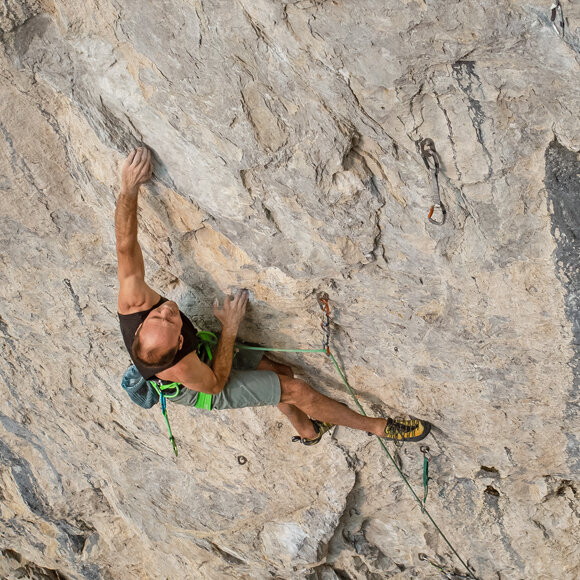Favorite places to live/ climb/ visit:
As matter of fact, I am happy anywhere where I can climb.
Favorite type of climbing:
Sport climbing

Honour and Glory 5.14c , Prime Time 5.14c, No surrender 5.14b first assent

As matter of fact, I am happy anywhere where I can climb.
Sport climbing
Hard to say, there are so many things I am still discovering about myself 😊
The very first visit to the Tatra Mountains triggered something and I knew I wanted to spend more time in the mountains. Luckily, there was mountaineering club in my town which I joined few years later. I spent almost every day trying to climb at the little climbing wall we had there.
I was inspired by all the great climbers back in a day like Ben Moon, Jerry Moffat, Wolfgang Gullich, and so on. I hope I can inspire some of the older gang to keep on cranking!
I don’t think there was one. I think that it is a tapestry of all experiences I’ve had, climbing challenges and victories that shaped me. The most important part of it all is my growth and reflection as a person and a climber: Why do I do what I do? What will keep me focused and help me push my boundaries?
I badly broke my collarbone mountain biking and ended up having surgery. That took me out of action for quite a while. I felt strong at that time so it was pretty devastating to me. What changed afterward was that I got even stronger.
I’ve had so many great moments while climbing. The best part of it is when you can share it with the ones close to you. It always feels like they are part of it and it would not happen without their support - it stays with you forever.
In a way I always trained, back in a day, when most of us had no clue what we were doing, it was kind of a hit and miss. These days with extremely busy lifestyle I like to have structured training plan that allows me to focus on what is crucial for me and work towards my goals. Plus, I like training anyway.
I think consistency is important here: do not change things on a weekly basis, do not pound on something you are good at. The gains are probably somewhere else to be made.
It’s definitely great to have gyms around especially during winter time. And the system walls are great. Both play a huge role training-wise as well as socially. Unfortunately, nowadays gym route setting does not translate well to rock.
Once or twice a year when fitness is at its finest. One finger pull-up is still a mystery to be solved.
There must be some skill there I would imagine, but it’s also a lot of work and passion for climbing.
I’m not entirely sure it is for everyone as some of it may be related to physical ability or barriers. There are plenty of hard-core climbers who still cannot do a one-arm pull-up. It is fun to do though if you can.
Setting certain goals, both short- and long-term, is very important. Goal-setting truly motivates me to improve as a climber. I feel like I have many goals! From a weekend warrior point of view, I don’t think I have to ever worry about running out of them.
Focusing on grades seems to be one of the goals for a lot of climbers – we have all been there. One of the core goals I have been working towards recently is to focus on the intention of experience and purity of movement in each climbing adventure.
Hard is part of the equation, and also the reason why I’m so drawn to climbing. I work hard towards my goals and don’t give up easily. Of course, frustration is part of the process but it’s just temporary and it frequently results in motivation to train harder or to reassess the strategy. I know the route will be there for me next time I come back.
At least in the area where I live, I would love to see more people paying attention not only to pushing route development, but also to trail maintenance, as well as keeping the trails and climbing areas clean. We are custodians and need to take steps to ensure access to the mountains for future generations to come.
With huge increase in gyms and the presence of climbing in the Olympics, we have seen a huge influx of new climbers. Our responsibility is to set certain standards and expectations. We need to ensure that climbing as an enjoyment of the outdoors comes with responsibility for our role in preservation of the environment. We need to ensure that access remains open and our community is seen as the custodians of those areas.